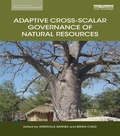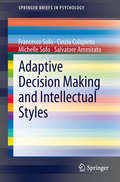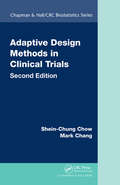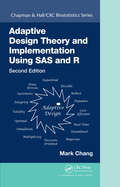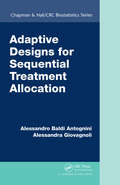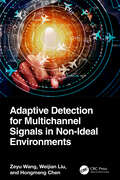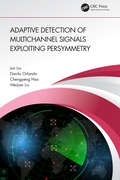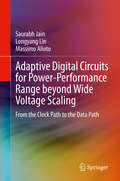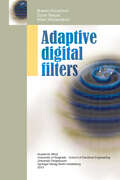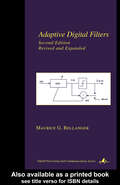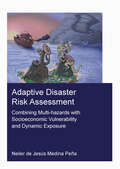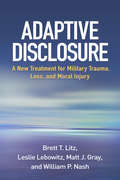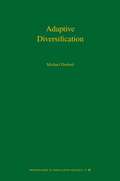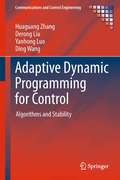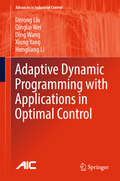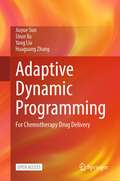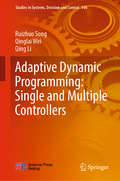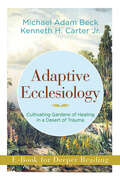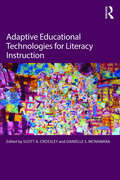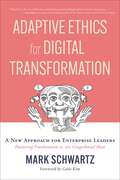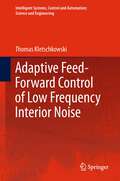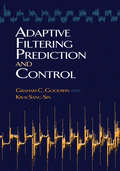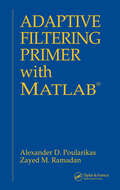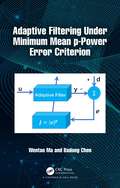- Table View
- List View
Adaptive Cross-scalar Governance of Natural Resources (Earthscan Studies in Natural Resource Management)
by Brian Child Grenville BarnesNatural resource governance is critical for linking poverty reduction and sustainable natural resource use. This book brings together authors from various disciplines with extensive field experience to promote an integrative understanding of cross-scale and adaptive governance in Africa and Latin America. The authors make the case for reaching beyond decentralization to promote adaptive governance that serves local priorities, but through interactions with local, district, national and global governance structures. The book focuses on the governance of common pool resources such as forests, wildlife, water, carbon and pasture resources in both Africa and Latin America. This book will appeal to development practitioners and scholars concerned about the conservation of natural resources and the sustainable development of communities. It synthesizes experience with the governance of different natural resources from a broad geographic perspective. It also provides theoretical and practical suggestions for taking adaptive natural resource governance forward, including participatory methods for measuring and monitoring governance.
Adaptive Decision Making and Intellectual Styles (SpringerBriefs in Psychology #13)
by Salvatore Ammirato Francesco Sofo Cinzia Colapinto Michelle SofoThis exciting publication provides the reader with a theoretical and practical approach to adaptive decision making, based on an appreciation of cognitive styles, in a cross-cultural context. The aim of this Brief is to describe the role of thinking-through different options as part of the decision-making process. Since cognitive style influences decision behavior, the book will first examine thinking styles, which involve both cognitive and emotive elements, as habits or preferences that shape and empower one's cognition and emotion. The information contained in this Brief will be a useful resource to both researchers studying decision making as well as to instructors in the higher education sector and to human resource development practitioners, especially those working in international, multi-cultural companies.
Adaptive Design Methods in Clinical Trials (Chapman & Hall/CRC Biostatistics Series)
by Mark Chang Shein-Chung ChowWith new statistical and scientific issues arising in adaptive clinical trial design, including the U.S. FDA's recent draft guidance, a new edition of one of the first books on the topic is needed. Adaptive Design Methods in Clinical Trials, Second Edition reflects recent developments and regulatory positions on the use of adaptive designs in clini
Adaptive Design Theory and Implementation Using SAS and R (Chapman & Hall/CRC Biostatistics Series)
by Mark ChangGet Up to Speed on Many Types of Adaptive DesignsSince the publication of the first edition, there have been remarkable advances in the methodology and application of adaptive trials. Incorporating many of these new developments, Adaptive Design Theory and Implementation Using SAS and R, Second Edition offers a detailed framework to understand the
Adaptive Designs for Sequential Treatment Allocation
by Alessandro Baldi Antognini Alessandra GiovagnoliAdaptive Designs for Sequential Treatment Allocation presents a rigorous theoretical treatment of the results and mathematical foundation of adaptive design theory. The book focuses on designing sequential randomized experiments to compare two or more treatments incorporating information accrued along the way. The authors first introduce the terminology and statistical models most commonly used in comparative experiments. They then illustrate biased coin and urn designs that only take into account past treatment allocations as well as designs that use past data, such as sequential maximum likelihood and various types of doubly adaptive designs. The book also covers multipurpose adaptive experiments involving utilitarian choices and ethical issues. It ends with adaptive methods that include covariates in the design. The appendices present basic tools of optimal design theory and address Bayesian adaptive designs.This book helps readers fully understand the theoretical properties behind various adaptive designs. Readers are then equipped to choose the best design for their experiment.
Adaptive Detection for Multichannel Signals in Non-Ideal Environments
by Weijian Liu Zeyu Wang Hongmeng ChenThis book systematically presents adaptive multichannel signal detection in three types of non-ideal environments, including sample-starved scenarios, signal mismatch scenarios, and noise plus subspace interference environments.The authors provide definitions of key concepts, detailed derivations of adaptive multichannel signal detectors, and specific examples for each non-ideal environment. In addition, the possible future trend of adaptive detection methods is discussed, as well as two further research points – namely, the adaptive detection algorithms based on information geometry, and the hybrid approaches that combine adaptive detection algorithms with machine learning algorithms.The book will be of interest to researchers, advanced undergraduates, and graduate students in sonar, radar signal processing, and communications engineering.
Adaptive Detection of Multichannel Signals Exploiting Persymmetry
by Jun Liu Chengpeng Hao Danilo Orlando Weijian LiuThis book offers a systematic presentation of persymmetric adaptive detection, including detector derivations and the definition of key concepts, followed by detailed discussion relating to theoretical underpinnings, design methodology, design considerations, and techniques enabling its practical implementation. The received data for modern radar systems are usually multichannel, namely, vector-valued, or even matrix-valued. Multichannel signal detection in Gaussian backgrounds is a fundamental problem for radar applications. With an overarching focus on persymmetric adaptive detectors, this book presents the mathematical models and design principles necessary for analyzing the behavior of each kind of persymmetric adaptive detector. Building upon that, it also introduces new design approaches and techniques that will guide engineering students as well as radar engineers toward efficient detector solutions, especially in challenging sample-starved environments where training data are limited. This book will be of interest to students, scholars, and engineers in the field of signal processing. It will be especially useful for those who have a solid background in statistical signal processing, multivariate statistical analysis, matrix theory, and mathematical analysis.
Adaptive Digital Circuits for Power-Performance Range beyond Wide Voltage Scaling: From the Clock Path to the Data Path
by Massimo Alioto Saurabh Jain Longyang LinThis book offers the first comprehensive coverage of digital design techniques to expand the power-performance tradeoff well beyond that allowed by conventional wide voltage scaling. Compared to conventional fixed designs, the approach described in this book makes digital circuits more versatile and adaptive, allowing simultaneous optimization at both ends of the power-performance spectrum. Drop-in solutions for fully automated and low-effort design based on commercial CAD tools are discussed extensively for processors, accelerators and on-chip memories, and are applicable to prominent applications (e.g., IoT, AI, wearables, biomedical). Through the higher power-performance versatility techniques described in this book, readers are enabled to reduce the design effort through reuse of the same digital design instance, across a wide range of applications. All concepts the authors discuss are demonstrated by dedicated testchip designs and experimental results. To make the results immediately usable by the reader, all the scripts necessary to create automated design flows based on commercial tools are provided and explained.
Adaptive Digital Filters
by Zoran Banjac Milan Milosavljević Branko Kovačević"Adaptive Digital Filters" presents an important discipline applied to the domain of speech processing. The book first makes the reader acquainted with the basic terms of filtering and adaptive filtering, before introducing the field of advanced modern algorithms, some of which are contributed by the authors themselves. Working in the field of adaptive signal processing requires the use of complex mathematical tools. The book offers a detailed presentation of the mathematical models that is clear and consistent, an approach that allows everyone with a college level of mathematics knowledge to successfully follow the mathematical derivations and descriptions of algorithms. The algorithms are presented in flow charts, which facilitates their practical implementation. The book presents many experimental results and treats the aspects of practical application of adaptive filtering in real systems, making it a valuable resource for both undergraduate and graduate students, and for all others interested in mastering this important field.
Adaptive Digital Filters (Signal Processing and Communications)
by Maurice BellangerThis text emphasizes the intricate relationship between adaptive filtering and signal analysis - highlighting stochastic processes, signal representations and properties, analytical tools, and implementation methods. This second edition includes new chapters on adaptive techniques in communications and rotation-based algorithms. It provides practical applications in information, estimation, and circuit theories.
Adaptive Disaster Risk Assessment: Combining Multi-Hazards with Socioeconomic Vulnerability and Dynamic Exposure (IHE Delft PhD Thesis Series)
by Neiler Medina PenaClimate change, combined with the rapid and often unplanned urbanisation trends, is associated with a rising trend in the frequency and severity of disasters triggered by natural hazards. In order to face the impacts of such threats, it is necessary to have an appropriate Disaster Risk Assessment (DRA). Traditional DRA approaches for disaster risk reduction (DRR) have focused mainly on the hazard component of risk, with little attention to the vulnerability and the exposure components. To address this issue, this dissertation’s main objective is to develop and test a disaster risk modelling framework that incorporates socioeconomic vulnerability and the adaptive nature of exposure associated with human behaviour in extreme hydro-meteorological events in the context of SIDS. To achieve the objective, an Adaptive Disaster Risk Assessment (ADRA) framework is proposed. ADRA uses an index-based approach (PeVI) to assess the socioeconomic vulnerability using three components: susceptibility, lack of coping capacities, and lack of adaptation. Furthermore, ADRA explicitly incorporates the exposure component using two approaches; first, a logistic regression model was built using the actual evacuation rates observed during Hurricane Irma, and second, an Agent-based model is used to simulate how households change their exposure levels in relation to different sources of information
Adaptive Disclosure: A New Treatment for Military Trauma, Loss, and Moral Injury
by Brett T. Litz Leslie Lebowitz Matt J. Gray William P. NashA complete guide to an innovative, research-based brief treatment specifically developed for service members and veterans, this book combines clinical wisdom and in-depth knowledge of military culture. <P><P>Adaptive disclosure is designed to help those struggling in the aftermath of traumatic war-zone experiences, including life threat, traumatic loss, and moral injury, the violation of closely held beliefs or codes. Detailed guidelines are provided for assessing clients and delivering individualized interventions that integrate emotion-focused experiential strategies with elements of cognitive-behavioral therapy (CBT). Reproducible handouts can be downloaded and printed in a convenient 8 1/2" x 11" size.
Adaptive Diversification (Monographs in Population Biology #48)
by Michael DoebeliUnderstanding the mechanisms driving biological diversity remains a central problem in ecology and evolutionary biology. Traditional explanations assume that differences in selection pressures lead to different adaptations in geographically separated locations. This book takes a different approach and explores adaptive diversification--diversification rooted in ecological interactions and frequency-dependent selection. In any ecosystem, birth and death rates of individuals are affected by interactions with other individuals. What is an advantageous phenotype therefore depends on the phenotype of other individuals, and it may often be best to be ecologically different from the majority phenotype. Such rare-type advantage is a hallmark of frequency-dependent selection and opens the scope for processes of diversification that require ecological contact rather than geographical isolation. Michael Doebeli investigates adaptive diversification using the mathematical framework of adaptive dynamics. Evolutionary branching is a paradigmatic feature of adaptive dynamics that serves as a basic metaphor for adaptive diversification, and Doebeli explores the scope of evolutionary branching in many different ecological scenarios, including models of coevolution, cooperation, and cultural evolution. He also uses alternative modeling approaches. Stochastic, individual-based models are particularly useful for studying adaptive speciation in sexual populations, and partial differential equation models confirm the pervasiveness of adaptive diversification. Showing that frequency-dependent interactions are an important driver of biological diversity, Adaptive Diversification provides a comprehensive theoretical treatment of adaptive diversification.
Adaptive Dynamic Programming for Control: Algorithms and Stability (Communications and Control Engineering)
by Yanhong Luo Huaguang Zhang Ding Wang Derong LiuThere are many methods of stable controller design for nonlinear systems. In seeking to go beyond the minimum requirement of stability, Adaptive Dynamic Programming in Discrete Time approaches the challenging topic of optimal control for nonlinear systems using the tools of adaptive dynamic programming (ADP). The range of systems treated is extensive; affine, switched, singularly perturbed and time-delay nonlinear systems are discussed as are the uses of neural networks and techniques of value and policy iteration. The text features three main aspects of ADP in which the methods proposed for stabilization and for tracking and games benefit from the incorporation of optimal control methods: * infinite-horizon control for which the difficulty of solving partial differential Hamilton-Jacobi-Bellman equations directly is overcome, and proof provided that the iterative value function updating sequence converges to the infimum of all the value functions obtained by admissible control law sequences; * finite-horizon control, implemented in discrete-time nonlinear systems showing the reader how to obtain suboptimal control solutions within a fixed number of control steps and with results more easily applied in real systems than those usually gained from infinite-horizon control; * nonlinear games for which a pair of mixed optimal policies are derived for solving games both when the saddle point does not exist, and, when it does, avoiding the existence conditions of the saddle point. Non-zero-sum games are studied in the context of a single network scheme in which policies are obtained guaranteeing system stability and minimizing the individual performance function yielding a Nash equilibrium. In order to make the coverage suitable for the student as well as for the expert reader, Adaptive Dynamic Programming in Discrete Time: * establishes the fundamental theory involved clearly with each chapter devoted to a clearly identifiable control paradigm; * demonstrates convergence proofs of the ADP algorithms to deepen understanding of the derivation of stability and convergence with the iterative computational methods used; and * shows how ADP methods can be put to use both in simulation and in real applications. This text will be of considerable interest to researchers interested in optimal control and its applications in operations research, applied mathematics computational intelligence and engineering. Graduate students working in control and operations research will also find the ideas presented here to be a source of powerful methods for furthering their study.
Adaptive Dynamic Programming with Applications in Optimal Control (Advances in Industrial Control)
by Ding Wang Derong Liu Qinglai Wei Xiong Yang Hongliang LiThis book covers the most recent developments in adaptive dynamic programming (ADP). The text begins with a thorough background review of ADP making sure that readers are sufficiently familiar with the fundamentals. In the core of the book, the authors address first discrete- and then continuous-time systems. Coverage of discrete-time systems starts with a more general form of value iteration to demonstrate its convergence, optimality, and stability with complete and thorough theoretical analysis. A more realistic form of value iteration is studied where value function approximations are assumed to have finite errors. Adaptive Dynamic Programming also details another avenue of the ADP approach: policy iteration. Both basic and generalized forms of policy-iteration-based ADP are studied with complete and thorough theoretical analysis in terms of convergence, optimality, stability, and error bounds. Among continuous-time systems, the control of affine and nonaffine nonlinear systems is studied using the ADP approach which is then extended to other branches of control theory including decentralized control, robust and guaranteed cost control, and game theory. In the last part of the book the real-world significance of ADP theory is presented, focusing on three application examples developed from the authors' work: * renewable energy scheduling for smart power grids; * coal gasification processes; and * water-gas shift reactions. Researchers studying intelligent control methods and practitioners looking to apply them in the chemical-process and power-supply industries will find much to interest them in this thorough treatment of an advanced approach to control.
Adaptive Dynamic Programming: For Chemotherapy Drug Delivery
by Huaguang Zhang Yang Liu Jiayue Sun Shun XuThis open access book focuses on the practical application of Adaptive Dynamic Programming (ADP) in chemotherapy drug delivery, taking into account clinical variables and real-time data. ADP's ability to adapt to changing conditions and make optimal decisions in complex and uncertain situations makes it a valuable tool in addressing pressing challenges in healthcare and other fields. As optimization technology evolves, we can expect to see even more sophisticated and powerful solutions emerge.
Adaptive Dynamic Programming: Single and Multiple Controllers (Studies in Systems, Decision and Control #166)
by Qing Li Qinglai Wei Ruizhuo SongThis book presents a class of novel optimal control methods and games schemes based on adaptive dynamic programming techniques. For systems with one control input, the ADP-based optimal control is designed for different objectives, while for systems with multi-players, the optimal control inputs are proposed based on games. In order to verify the effectiveness of the proposed methods, the book analyzes the properties of the adaptive dynamic programming methods, including convergence of the iterative value functions and the stability of the system under the iterative control laws. Further, to substantiate the mathematical analysis, it presents various application examples, which provide reference to real-world practices.
Adaptive Ecclesiology: Cultivating Gardens of Healing in a Desert of Trauma
by Kenneth H. Carter Jr. Michael Adam BeckThis digital-only e-book provides foundational material on adaptive leadership for the church. It is for seminary students, people training for ministry in other settings, and local church leaders who are striving to understand the biblical and theological underpinnings of adaptive ecclesiology. These readers will also gain knowledge about how this approach has worked historically, and how it is used inside and outside the Church today. The authors’ main book on the topic, Gardens in the Desert: How the Adaptive Church Can Lead a Whole New Life, is more practical in its focus, helping pastors and other leaders know how to begin shifting toward adaptive ecclesiology in their own local churches. The Adaptive Ecclesiology digital-only e-book is a deeper look at the foundations of the topic.
Adaptive Educational Technologies for Literacy Instruction
by Scott A. Crossley Danielle S. McNamaraWhile current educational technologies have the potential to fundamentally enhance literacy education, many of these tools remain unknown to or unused by today’s practitioners due to a lack of access and support. Adaptive Educational Technologies for Literacy Instruction presents actionable information to educators, administrators, and researchers about available educational technologies that provide adaptive, personalized literacy instruction to students of all ages. These accessible, comprehensive chapters, written by leading researchers who have developed systems and strategies for classrooms, introduce effective technologies for reading comprehension and writing skills.
Adaptive Engineering, LLC
by Richard S. Ruback Royce YudkoffThe owner and CEO of Adaptive Engineering was facing an important decision: should he focus on rebuilding its core professional services business which had generated significant revenue and cash flow over the past several years, or should he focus on developing and marketing licensed software which had been under development for several years but had yet to become profitable.
Adaptive Ethics for Digital Transformation: A New Approach for Enterprise Leaders (Featuring Frankenstein vs. the Gingerbread Man)
by Mark SchwartzDigital transformation doesn't just raise ethical issues, it—in itself—is an ethical shift.Business leaders today are struggling to manage conflicting imperatives, those of the emerging digital world and those of the bureaucratic world of the past. The act of digital transformation requires a deep change in the moral outlook and ethical assumptions of a business. But how do we get there?Enterprise strategist and author Mark Schwartz shows how we need to learn to think differently about relationships with customers and employees. That the ethics of digital transformation is a matter of cultivating and applying virtues rather than applying rules. Ethics is not just a matter of refraining from doing bad things. It's a matter of building the world we want, and it's the job of company executives.Featuring a chapter on bullshit, a handy chart of excuses for bad behavior, and Schwartz's typically paradoxical blend of deep insight and pasta jokes, this book guides business leaders as they struggle to adapt their bureaucratic framework of ethics to the emerging landscape of the digital world. By the end of the book, business leaders will rethink what it takes to be an ethical organization.
Adaptive Feed-Forward Control of Low Frequency Interior Noise (Intelligent Systems, Control and Automation: Science and Engineering #56)
by Thomas KletschkowskiThis book presents a mechatronic approach to Active Noise Control (ANC). It describes the required elements of system theory, engineering acoustics, electroacoustics and adaptive signal processing in a comprehensive, consistent and systematic manner using a unified notation. Furthermore, it includes a design methodology for ANC-systems, explains its application and describes tools to be used for ANC-system design. From the research point of view, the book presents new approaches to sound source localization in weakly damped interiors. One is based on the inverse finite element method, the other is based on a sound intensity probe with an active free field. Furthermore, a prototype of an ANC-system able to reach the physical limits of local (feed-forward) ANC is described. This is one example for applied research in ANC-system design. Other examples are given for (i) local ANC in a semi-enclosed subspace of an aircraft cargo hold and (ii) for the combination of audio entertainment with ANC.
Adaptive Filtering Prediction and Control
by Kwai Sang Sin Graham C GoodwinThis unified survey of the theory of adaptive filtering, prediction, and control focuses on linear discrete-time systems and explores the natural extensions to nonlinear systems. In keeping with the importance of computers to practical applications, the authors emphasize discrete-time systems. Their approach summarizes the theoretical and practical aspects of a large class of adaptive algorithms.Ideal for advanced undergraduate and graduate classes, this treatment consists of two parts. The first section concerns deterministic systems, covering models, parameter estimation, and adaptive prediction and control. The second part examines stochastic systems, exploring optimal filtering and prediction, parameter estimation, adaptive filtering and prediction, and adaptive control. Extensive appendices offer a summary of relevant background material, making this volume largely self-contained. Readers will find that these theories, formulas, and applications are related to a variety of fields, including biotechnology, aerospace engineering, computer sciences, and electrical engineering.
Adaptive Filtering Primer with MATLAB
by Alexander D. Poularikas Zayed M. Ramadan<p>Because of the wide use of adaptive filtering in digital signal processing and, because most of the modern electronic devices include some type of an adaptive filter, a text that brings forth the fundamentals of this field was necessary. The material and the principles presented in this book are easily accessible to engineers, scientists, and students who would like to learn the fundamentals of this field and have a background at the bachelor level. <p>Adaptive Filtering Primer with MATLAB clearly explains the fundamentals of adaptive filtering supported by numerous examples and computer simulations. The authors introduce discrete-time signal processing, random variables and stochastic processes, the Wiener filter, properties of the error surface, the steepest descent method, and the least mean square (LMS) algorithm. They also supply many MATLAB functions and m-files along with computer experiments to illustrate how to apply the concepts to real-world problems. The book includes problems along with hints, suggestions, and solutions for solving them. An appendix on matrix computations completes the self-contained coverage. <p>With applications across a wide range of areas, including radar, communications, control, medical instrumentation, and seismology, Adaptive Filtering Primer with MATLAB is an ideal companion for quick reference and a perfect, concise introduction to the field.</p>
Adaptive Filtering Under Minimum Mean p-Power Error Criterion
by Badong Chen Wentao MaAdaptive filtering still receives attention in engineering as the use of the adaptive filter provides improved performance over the use of a fixed filter under the time-varying and unknown statistics environments. This application evolved communications, signal processing, seismology, mechanical design, and control engineering. The most popular optimization criterion in adaptive filtering is the well-known minimum mean square error (MMSE) criterion, which is, however, only optimal when the signals involved are Gaussian-distributed. Therefore, many "optimal solutions" under MMSE are not optimal. As an extension of the traditional MMSE, the minimum mean p-power error (MMPE) criterion has shown superior performance in many applications of adaptive filtering. This book aims to provide a comprehensive introduction of the MMPE and related adaptive filtering algorithms, which will become an important reference for researchers and practitioners in this application area. The book is geared to senior undergraduates with a basic understanding of linear algebra and statistics, graduate students, or practitioners with experience in adaptive signal processing.Key Features: Provides a systematic description of the MMPE criterion. Many adaptive filtering algorithms under MMPE, including linear and nonlinear filters, will be introduced. Extensive illustrative examples are included to demonstrate the results.
